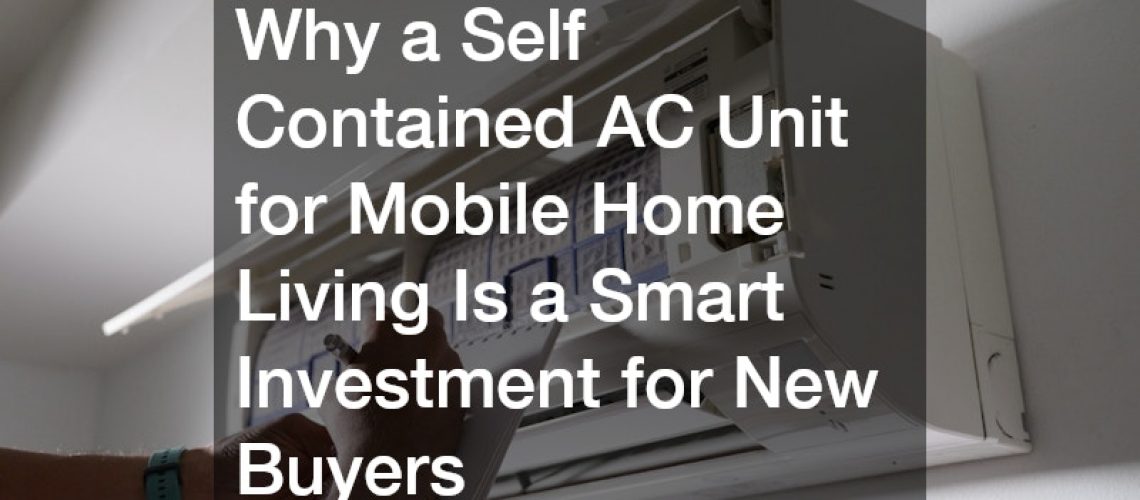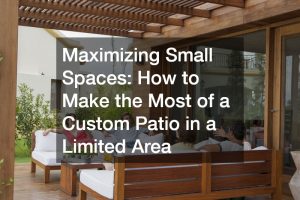When it comes to cooling systems for compact spaces, such as mobile homes, choosing the right option is crucial for comfort and energy efficiency. With advancements in technology, there are now all-in-one climate control units that offer a range of benefits for homeowners. In this article, we will explore the advantages of these systems, discuss energy efficiency, and provide tips for first-time buyers.
Choosing the Right Cooling System for a Compact Space
For mobile homes, a self-contained AC unit is often the best option for cooling. These units are compact and efficient, making them ideal for small spaces. When selecting a cooling system, it’s important to consider factors such as the size of the space, the climate in which you live, and your budget. Consulting with local home builders or HVAC professionals can help you make an informed decision.
Additionally, consider upgrading to impact windows and doors to improve insulation and reduce energy costs. These upgrades can work together with your cooling system to create a more comfortable indoor environment. Be sure to also consider the long-term value of the system, as investing in a high-quality unit can pay off in energy savings over time.
If you’re considering an AC replacement or upgrading your current system, be sure to research different models and brands to find one that meets your needs. Look for energy-efficient models that are designed for small spaces and offer features such as programmable thermostats and smart home integration.
The Benefits of All-in-One Climate Control Units
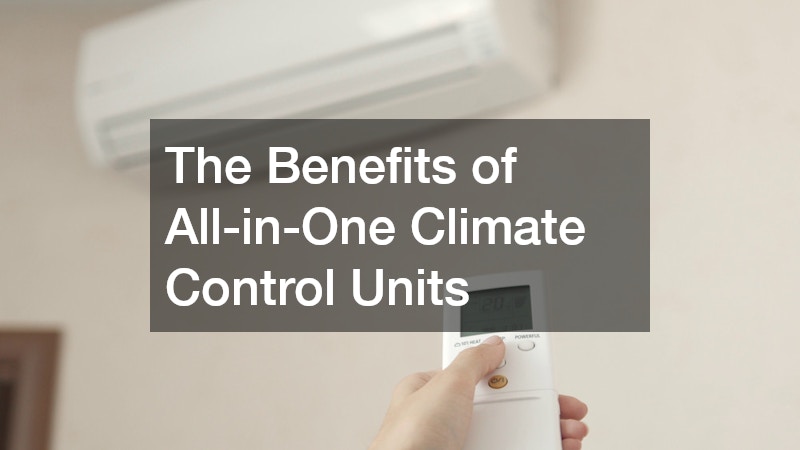
All-in-one climate control units offer a convenient solution for cooling and heating your mobile home. These units are self-contained, meaning they include both the cooling and heating components in one system. This can save space and reduce installation costs compared to traditional split systems.
With an all-in-one unit, you can easily control the temperature in your home with a single device. Many modern units also offer programmable thermostats and smart home integration, allowing you to adjust the temperature remotely. This level of convenience can make your daily life more comfortable and efficient.
Additionally, all-in-one units are often more energy-efficient than traditional HVAC systems. By combining both heating and cooling functions, these units can reduce energy consumption and lower your utility bills. Investing in an energy-efficient system can also increase the resale value of your home.
Energy Efficiency That Pays Off Long-Term
When it comes to cooling systems, energy efficiency is key for long-term savings. Self-contained AC units for mobile homes are designed to be more efficient than traditional systems, helping you save on your energy bills. By investing in an energy-efficient unit, you can reduce your carbon footprint and lower your monthly expenses.
Pairing your cooling system with other energy-saving upgrades, such as impact windows and doors, can further improve efficiency. These upgrades can help reduce drafts and air leakage, keeping your home comfortable year-round. By investing in energy-efficient upgrades, you can make your home more sustainable and environmentally friendly.
When considering the upfront costs of an energy-efficient cooling system, it’s important to look at the long-term value. While you may pay more initially for a high-quality unit, the energy savings over time can outweigh the initial investment. Additionally, many energy-efficient systems come with rebates and incentives that can help offset the cost.
What First-Time Buyers Should Know About Mobile Comfort
For first-time buyers of mobile homes, choosing the right cooling system is an important decision. Self-contained air conditioning units are often the best option for small spaces, offering efficient cooling without taking up a lot of room. When shopping for a cooling system, consider factors such as the size of your home, your budget, and the climate in which you live.
Consulting with local home builders or HVAC professionals can help you make an informed decision about which cooling system is right for your needs. These experts can provide guidance on the best options for energy efficiency, comfort, and long-term value. They can also help you understand the installation process and what to expect in terms of maintenance and repairs.
When purchasing homes for sale, be sure to inquire about the age and condition of the cooling system. If the system is outdated or in need of repair, factor in the cost of an AC replacement when budgeting for your new home. Investing in a high-quality cooling system can make your living space more comfortable and energy-efficient.
Pairing Modern Cooling with Smart Home Upgrades
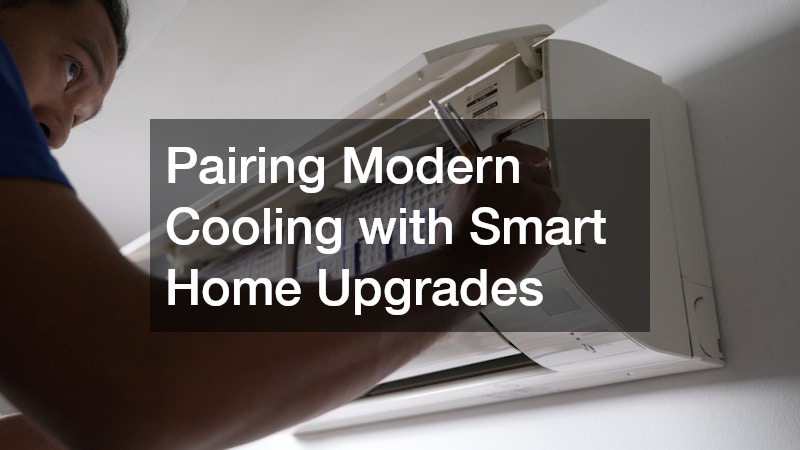
Modern cooling systems offer a range of features that can be enhanced with smart home upgrades. Many self-contained AC units come with programmable thermostats and WiFi connectivity, allowing you to control the temperature remotely. By pairing your cooling system with smart home technology, you can make your home more comfortable and convenient.
Consider investing in home automation devices, such as smart thermostats and energy monitors, to optimize your cooling system’s performance. These devices can help you track your energy usage, adjust the temperature based on your schedule, and receive alerts for maintenance issues. By integrating smart home upgrades with your cooling system, you can create a more efficient and comfortable living environment.
Additionally, consider upgrading to energy-efficient appliances and lighting to further reduce your home’s energy consumption. Investing in energy-saving upgrades can help you lower your utility bills and reduce your environmental impact. By combining modern cooling technology with smart home features, you can create a more sustainable and comfortable living space.
Upfront Costs vs. Long-Term Value in Climate Control
When it comes to investing in a self-contained AC unit for your mobile home, it’s important to weigh the upfront costs against the long-term value. While high-quality systems may come with a higher price tag initially, the energy savings and comfort they provide can make them a worthwhile investment. Consider factors such as energy efficiency, warranty coverage, and maintenance costs when comparing different models.
Look for systems that are Energy Star certified, as these units meet strict energy efficiency guidelines set by the Environmental Protection Agency. Energy-efficient systems can help you reduce your energy consumption and lower your utility bills. Many energy-efficient models also come with rebates and incentives that can offset the initial cost of the system.
When budgeting for a cooling system, be sure to also consider the long-term value it will provide. High-quality systems are built to last and require less maintenance over time, saving you money on repairs and replacements. By investing in a reliable cooling system, you can enjoy a comfortable indoor environment for years to come.
Working with Contractors Who Understand Mobile Home Needs
When installing a self-contained AC unit in your mobile home, it’s important to work with contractors who understand the unique needs of these spaces. Mobile homes have specific requirements when it comes to cooling systems, such as limited space and ductwork options. Hiring a contractor who specializes in mobile home HVAC installations can ensure that the system is installed properly and efficiently.
Before hiring a contractor, be sure to research their credentials, experience, and reputation in the industry. Look for contractors who have experience working with mobile homes and are familiar with the challenges of installing cooling systems in these spaces. Ask for references and make sure to get a detailed estimate before beginning the installation process.
Working with a reputable contractor can help you avoid costly mistakes and ensure that your cooling system is installed correctly. A skilled contractor can also provide advice on the best options for energy efficiency, maintenance, and repairs. By partnering with professionals who understand mobile home needs, you can enjoy a comfortable and efficient cooling system in your home.
How New Builds Are Adapting to Climate Efficiency Standards
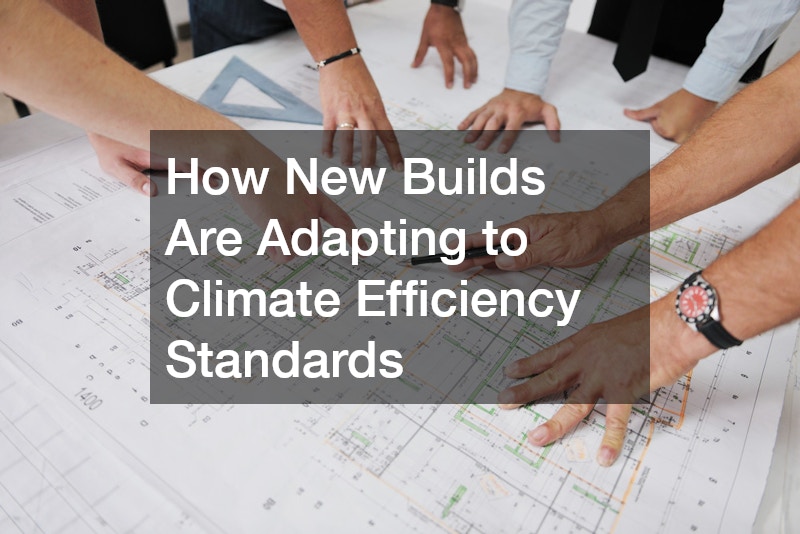
With an increased focus on energy efficiency and sustainability, new builds are adapting to climate efficiency standards when it comes to cooling systems. Builders are incorporating self-contained AC units into their designs to meet the growing demand for energy-efficient homes. These units are designed to provide efficient cooling while reducing energy consumption and environmental impact.
When purchasing a new build, inquire about the cooling system and its energy efficiency rating. Look for systems that are Energy Star certified and meet local climate efficiency standards. Energy-efficient cooling systems can help you save on your energy bills and reduce your carbon footprint, making your home more environmentally friendly.
Additionally, consider other energy-saving features in your new build, such as impact windows and doors, solar panels, and energy-efficient appliances. These upgrades can work together with your cooling system to create a more sustainable and comfortable living environment. By investing in a new build that prioritizes energy efficiency, you can enjoy long-term savings and a healthier home.
The Role of Exterior Design in Indoor Comfort
When it comes to indoor comfort, the exterior design of your home plays a crucial role in regulating temperature and energy efficiency. Upgrading features such as siding, insulation, and windows can improve insulation and reduce drafts, making your home more comfortable year-round. Investing in exterior upgrades can also enhance the curb appeal and resale value of your home.
Consider upgrading to impact windows and doors to improve energy efficiency and reduce noise pollution. These upgrades can help keep your home cool in the summer and warm in the winter, reducing your dependency on your cooling system. Impact windows and doors are also more durable and secure, providing added protection against harsh weather conditions.
When planning for exterior upgrades, consult with a reputable siding company to explore your options and determine the best solutions for your home. By investing in high-quality exterior design features, you can improve comfort, energy efficiency, and aesthetics. These upgrades can also make your home more attractive to potential buyers if you decide to sell in the future.
Integrating Backup Power with Home Cooling Systems
For mobile homeowners, integrating backup power systems with their cooling systems is essential for maintaining indoor comfort during power outages. Investing in a home generator can ensure that your self-contained AC unit continues to operate in the event of a blackout. Backup power systems provide peace of mind and security, especially during extreme weather conditions.
When considering a backup power system, consult with a local home builder or HVAC professional to determine the best option for your needs. Look for home generators that are compatible with your cooling system and can power essential appliances and electronics. By integrating backup power with your cooling system, you can maintain a comfortable indoor environment no matter the circumstances.
Additionally, consider investing in a water heater repair or replacement to ensure that you have access to hot water during power outages. A functioning water heater is essential for daily comfort and hygiene, especially in emergency situations. By preparing your home with backup power and essential repairs, you can stay comfortable and safe in any situation.
Planning for Future Repairs and Maintenance Costs
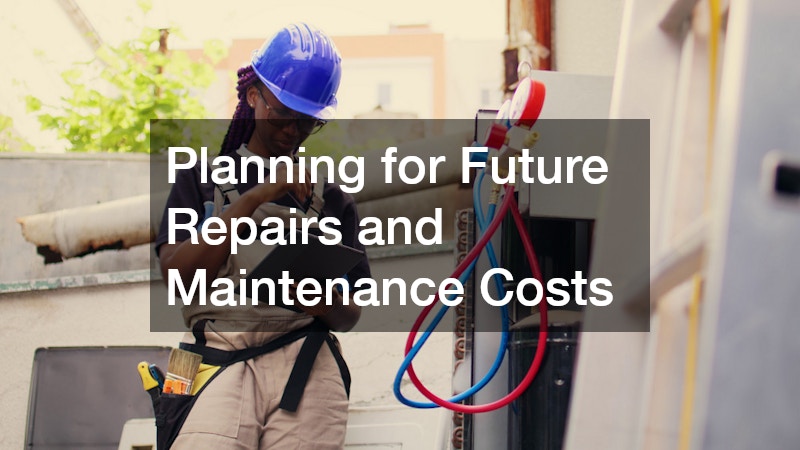
When investing in a self-contained AC unit for your mobile home, it’s important to plan for future repairs and maintenance costs. Like all cooling systems, self-contained units require regular maintenance to ensure optimal performance and longevity. By budgeting for routine maintenance and potential repairs, you can avoid unexpected expenses and keep your system running smoothly.
Consult with local HVAC professionals to determine the recommended maintenance schedule for your cooling system. Regular tasks such as filter changes, coil cleaning, and system inspections can help prevent costly repairs and extend the life of your unit. Investing in a maintenance plan with a reputable HVAC company can provide peace of mind and ensure that your system operates efficiently.
When budgeting for repairs, consider setting aside funds for unexpected issues that may arise. Factors such as wear and tear, extreme weather conditions, and system age can impact the need for repairs. By planning ahead and being proactive about maintenance, you can prolong the life of your cooling system and maximize its performance.
Cooling Systems That Increase Resale Appeal
Investing in a self-contained AC unit for your mobile home can increase the resale appeal of your property. Modern cooling systems are sought after by homebuyers for their energy efficiency, convenience, and comfort. By upgrading to a high-quality system, you can make your home more attractive to potential buyers and increase its value on the market.
When selling your home, highlight the features and benefits of your cooling system to prospective buyers. Point out the energy efficiency rating, programmable thermostat, and smart home integration capabilities. These selling points can set your home apart from others on the market and appeal to buyers looking for modern amenities.
Consider investing in other upgrades, such as impact windows and doors, to further enhance the resale appeal of your home. Energy-efficient features can make your property more attractive to environmentally conscious buyers and increase its market value. By investing in upgrades that increase resale appeal, you can maximize your return on investment when selling your home.
Financing Options for Heating and Cooling Upgrades
When investing in a self-contained AC unit or other heating and cooling upgrades for your home, consider the financing options available to you. Many homeowners rely on mortgages or home improvement loans to fund their HVAC projects. Research different financing options to determine the best solution for your budget and needs.
Consult with your mortgage lender or financial advisor to explore the financing options available for heating and cooling upgrades. Consider factors such as interest rates, loan terms, and repayment schedules when comparing different loans. Look for incentives or rebates that may be available for energy-efficient upgrades to help offset the cost.
Additionally, consider setting aside a budget for future repairs and maintenance costs when planning your financing. By budgeting for ongoing maintenance and potential repairs, you can ensure that your heating and cooling system remains in optimal condition. Investing in a high-quality system and proper maintenance can help you save money on utility bills and avoid costly repairs in the long run.
Conclusion
In conclusion, choosing the right cooling system for your mobile home is essential for comfort, energy efficiency, and long-term value. Self-contained AC units offer a convenient and efficient solution for small spaces, providing cooling and heating in one system. By investing in an energy-efficient system, pairing it with smart home upgrades, and planning for future maintenance costs, you can enjoy a comfortable and sustainable living environment.

